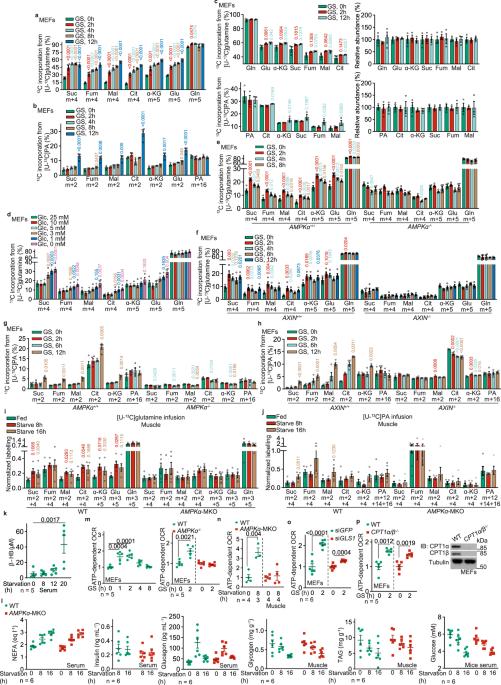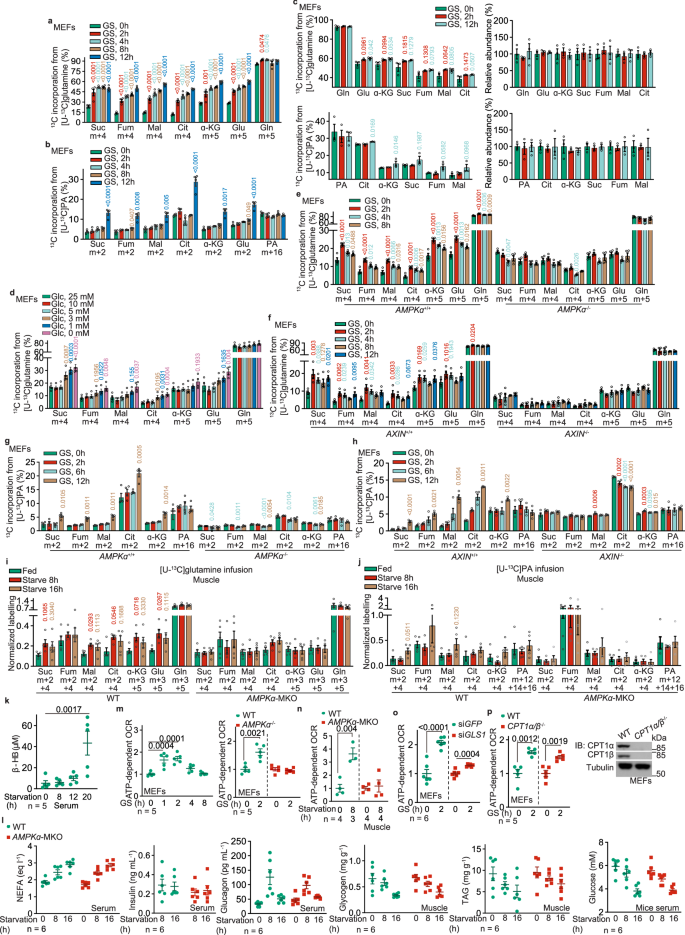AMPK targets PDZD8 to trigger carbon source shift from glucose to glutamine
IF 25.9
1区 生物学
Q1 CELL BIOLOGY
引用次数: 0
Abstract
The shift of carbon utilization from primarily glucose to other nutrients is a fundamental metabolic adaptation to cope with decreased blood glucose levels and the consequent decline in glucose oxidation. AMP-activated protein kinase (AMPK) plays crucial roles in this metabolic adaptation. However, the underlying mechanism is not fully understood. Here, we show that PDZ domain containing 8 (PDZD8), which we identify as a new substrate of AMPK activated in low glucose, is required for the low glucose-promoted glutaminolysis. AMPK phosphorylates PDZD8 at threonine 527 (T527) and promotes the interaction of PDZD8 with and activation of glutaminase 1 (GLS1), a rate-limiting enzyme of glutaminolysis. In vivo, the AMPK-PDZD8-GLS1 axis is required for the enhancement of glutaminolysis as tested in the skeletal muscle tissues, which occurs earlier than the increase in fatty acid utilization during fasting. The enhanced glutaminolysis is also observed in macrophages in low glucose or under acute lipopolysaccharide (LPS) treatment. Consistent with a requirement of heightened glutaminolysis, the PDZD8-T527A mutation dampens the secretion of pro-inflammatory cytokines in macrophages in mice treated with LPS. Together, we have revealed an AMPK-PDZD8-GLS1 axis that promotes glutaminolysis ahead of increased fatty acid utilization under glucose shortage.


AMPK 以 PDZD8 为靶标,触发碳源从葡萄糖向谷氨酰胺的转移。
碳的利用从主要利用葡萄糖转向利用其他营养物质,是应对血糖水平下降和随之而来的葡萄糖氧化下降的一种基本代谢适应。AMP 激活蛋白激酶(AMPK)在这种新陈代谢适应中起着至关重要的作用。然而,其潜在机制尚未完全明了。在这里,我们发现,PDZ 含域 8(PDZD8)是 AMPK 在低糖条件下激活的新底物,它是低糖促进谷氨酰胺溶解所必需的。AMPK 使 PDZD8 在苏氨酸 527 (T527) 处磷酸化,并促进 PDZD8 与谷氨酰胺酶 1 (GLS1) 的相互作用和激活,GLS1 是谷氨酰胺分解的限速酶。在体内,AMPK-PDZD8-GLS1 轴是增强谷氨酰胺酵解所必需的,骨骼肌组织的测试结果表明,谷氨酰胺酵解的增强早于禁食期间脂肪酸利用的增加。在低糖或急性脂多糖(LPS)处理下的巨噬细胞中也能观察到谷氨酰胺溶解的增强。PDZD8-T527A 突变抑制了经 LPS 处理的小鼠巨噬细胞中促炎细胞因子的分泌,这与谷氨酰胺分解增强的要求相一致。综上所述,我们揭示了 AMPK-PDZD8-GLS1 轴在葡萄糖不足的情况下促进谷氨酰胺酵解,而不是增加脂肪酸的利用。
本文章由计算机程序翻译,如有差异,请以英文原文为准。
求助全文
约1分钟内获得全文
求助全文
来源期刊

Cell Research
生物-细胞生物学
CiteScore
53.90
自引率
0.70%
发文量
2420
审稿时长
2.3 months
期刊介绍:
Cell Research (CR) is an international journal published by Springer Nature in partnership with the Center for Excellence in Molecular Cell Science, Chinese Academy of Sciences (CAS). It focuses on publishing original research articles and reviews in various areas of life sciences, particularly those related to molecular and cell biology. The journal covers a broad range of topics including cell growth, differentiation, and apoptosis; signal transduction; stem cell biology and development; chromatin, epigenetics, and transcription; RNA biology; structural and molecular biology; cancer biology and metabolism; immunity and molecular pathogenesis; molecular and cellular neuroscience; plant molecular and cell biology; and omics, system biology, and synthetic biology. CR is recognized as China's best international journal in life sciences and is part of Springer Nature's prestigious family of Molecular Cell Biology journals.
 求助内容:
求助内容: 应助结果提醒方式:
应助结果提醒方式:


